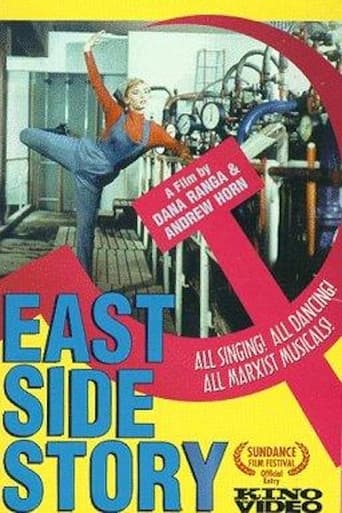vortexrider
East Side Story entertains and informs about an unknown part of Cold War history. What is the purpose of any documentary? To inform the reader through commentary and footage. This one succeeds at both. You will never find many movies whose clips you get to see in here because some of them have been destroyed and some are unaccessible.You get to see and her music from musicals made in East Germany, Russia, and other countries under Soviet Control. It shows you that the people who made these movies and the people who watched them all look for same things a Westerner would look for, which are pretty women and men singing and dancing on the streets with smiles and (hopefully) white teeth.
MarkusRTK
Don't go renting "East Side Story" because you want an insightful portrait of life in Communist countries through their musicals. Don't go renting it if you want a detailed technical study of the musical from an unusual point of view. Don't, by all means, go renting it if you want to cry over the poignancy of the worker's hardships manifested by singing. Do, however, rent it if you want to point at the TV and laugh "Ha ha! Dancing Communists! Ha ha ha!"Not to knock dancing Communists. Certainly "East Side Story" is a rollicking good time, but nothing more than that - this is no "Bowling for Columbine," certainly. The narration is insipid, and the interviews are of varying quality, but the clips from the musicals and the simply funny premise make this a recreational documentary that, by all means, go and check out if you've nothing meaningful to do.
sydhe
"East Side Story" is a documentary of musical comedy in Stalinist Russia and later in the eastern European satellite comedies, with many clips from the films and commentary from the survivors. Although some of the Stalinist films look laughingly bad (The Bright Road (?) being a notable exception), the films from the sixties actually look pretty good. "My Wife Wants to Sing," "The White Mouse," and "Midnight Revue" look particularly entertaining. The producers had to contend with the censors, who had the power to decide what was politically correct, which led to some confusion, humorous in retrospect, since the people whom the censors were trying to appease were the very people who supported making the films to begin with! Since musical comedies were fairly rare behind the Iron Curtain--there were only something like forty made in forty years--they had a disproportionate effect upon their audiences, who made major hits of some of the films.I notice that the sound for the sixties films was much better. The directors often had to make do with antiquated equipment, and stringent power regulations--they had to film in seven minute takes or less--and dangerous officicrats.I also notice that "West Side Story" seems to have had a strong influence on "Hot Summer." The later films may not measure up to "Singin' in the Rain," but they certainly look like they beat the hell out of "Bye Bye Birdy"
Eugene Kim
When I went to see this documentary on Communist bloc musicals, I was expecting something totally demented, along the lines of a Communist "Cop Rock." Some scenes did deliver, including a rousing clip from a Soviet film called "Tractor Drivers."You'd think that moviemakers given the task of making ideologically correct musicals that sing, dance and espouse the Party line face insurmountable odds. And yet, one of the surprises of "East Side Story" is that some of the films presented actually looked promising. One was a mid-1950s East German effort called "My Wife Wants to Sing," in which, as the title implies, an unhappy hausfrau seeks to launch a singing career over the objections of her traditionally-minded husband.Another genuinely interesting-looking movie, also from East Germany, was called "Midnight Revue." In this film-within-a-film, the producers spoof their own creative plight with the story of a group of filmmakers under Party orders to make a musical. (The on-screen filmmakers themselves get to do a musical number about avoiding "too hot" subjects very reminiscent in tone of the 1957 movie "Silk Stockings.")The documentary is marred by somewhat insipid narration, but it's still a lot of fun to watch. (Look for the closing dedication to the person who made it all possible.)
